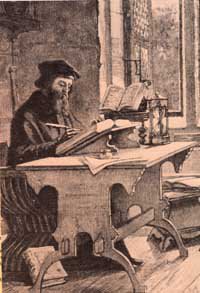Misquoting Jesus

I was at Costco the other day and came across this new book, Misquoting Jesus, among the other Christians-have-been-sold-a-bill-of-goods books now in vogue. I won’t be reading the book, for I haven’t the background in textual criticism needed to properly dispel its claims. But, thanks be to our Lord that we have men like Michael Kruger, Associate Professor of New Testament at Reformed Theological Seminary in Charlotte, NC, to bring his learned guns to bear over at the Reformation 21 site upon these modern gainsayers.
Purpose of the Book
In his book review, Professor Kruger explains author’s agenda behind the book:
In contrast to many of Ehrman’s prior works, Misquoting Jesus is written for a more popular audience and begins not with a survey of academic works on the subject but with somewhat of a personal "testimony" from Ehrman himself, cataloging his transition (or transformation) from naïve evangelical at Moody and Wheaton to enlightened scholar at Princeton Seminary. He describes how it was his early studies in textual criticism, and his subsequent awareness of scribal "mistakes," that first alerted him to the fact that his view of inerrancy might be flawed. Having finally admitted that the Bible has errors and mistakes, Ehrman said that the "floodgates opened" and he began to radically change his view of the Bible, concluding that the Bible was "a human book from beginning to end" (11). Ehrman’s personal testimony in the introduction, although interesting, strikes the reader as rather out of place for a piece of scholarship coming from the secular academy—after all, are not evangelicals prohibited from appealing to their personal experience in their scholarly works? Ironically, as Ehrman distances himself from his evangelical past, he actually engages in a sort of reverse-evangelism with the reader, hoping to convince any readers who are "literalists" (14), "fundamentalist" types (6), and "one-sided" (13) that they should reconsider their view of Scripture and adopt his own. Erhman’s appeal to his personal journey, if nothing else, gets his agenda for this book squarely on the table: to use the field of textual criticism as a means to challenge the evangelical doctrine of Scripture.How the Book is Divided
Professor Kruger points out that, although the book is divided into seven parts, Ehrman’s actual argument can be best conceived of in three parts.
- First, Ehrman begins his critique of the New Testament by arguing that the scribes of early Christianity—the first three centuries to be exact—were not in a position to make reliable copies due to the fact that they were not professional copyists but simply literate believers (some even illiterate!) who were willing to give it a try. Moreover, argues Ehrman, scribal activity in general was "maddeningly slow and inaccurate [and] that the copies produced this way could end up being quite different from the originals" (46).
- The second overall argument (spread through a number of chapters) is that the manuscripts themselves are so chocked full of scribal mistakes and inconsistencies that they cannot be trusted.
- The third argument put forth by Ehrman—and the pinnacle of his thesis—is that scribes not only changed the text accidentally, but changed the text intentionally for theological purposes.
Professor Kruger closes-out his review with an explanation as to the core problem with Ehrman’s book:
Ehrman is working with his own self-appointed definition of inspiration which sets up an arbitrary (and irrational) standard that could never be met. Does inspiration really require that once the books of the Bible were written that God would miraculously guarantee that no one would ever write it down incorrectly? Are we to believe that inspiration demands that no adult, no child, no scribe, no scholar, not anyone, would ever write down a passage of scripture where a word was left out—for the entire course of human history? Or is God prohibited by Ehrman from giving revelation until Guttenberg and the printing press? (But there are errors there too.) Would Ehrman have been more pleased if the New Testament were delivered from heaven on golden tablets, and not through normal historical processes? I imagine he would then object to the fact that the New Testament does not bear the "marks of history." It seems clear that Ehrman has investigated the New Testament documents with an a priori conviction that inspiration requires zero scribal variations—a standard that could never be met in the real historical world of the first century. Ironically, as much as Ehrman claims to be about real history, his private view of inspiration, by definition, prevents there from ever being a New Testament from God that that would have anything to do with real history. Not surprisingly, therefore, Ehrman’s book "concludes" that the New Testament could not be inspired. One wonders whether any other conclusion was even possible.Professor Kruger’s review is excellent, but long, especially where he answers each of Ehrman’s arguments. It is, however, most certainly worth the time. You can read it in its entirety here.
Labels: Apologetics, Doctrine of Scripture





